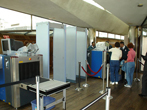The Nigerian bomber and the Obama administration

Nigerian-born Umar Farouk Abdulmutallab’s dastardly attempt to detonate a bomb on flight 253 has profound ramifications for all Africans and the African continent, writes Ama Biney, from tougher security checks for passengers flying from Muslim countries, to providing justification for a greater role for AFRICOM in tackling the ‘alleged global war on terrorism’. But, asks Biney, is increased military intervention an effective strategy for treating the root causes of terrorist attacks and building a safe and secure world for all?
In 1990 I vividly remember a white American customs official asking me at Dallas airport if I was a Nigerian and was I carrying drugs in my suitcase? For him, all Africans looked alike and nationality was unimportant. For me, it simply reinforced that all Africans were likely to be subjected to prejudice, racism and suspicion by certain elements of US officialdom regardless of class, age, or gender. Racial profiling has been around long before 9/11 and now with the arrest of Umar Farouk Abdulmutallab who dangerously tried to set himself alight on board flight 253 in Detroit on 25 December 2009, his dastardly act has profound ramifications for all Africans and the African continent.
Firstly, to date, the face of the terrorist has been Arab, then Asian (particularly in the UK where a few British Muslims have been involved in terrorist incidents); it is now Nigerian. However, for many Europeans and North Americans who tend to think of Africa as country, Nigerian indiscriminately equals all Africans.
Secondly, since the frightening incident, there have been swift moves to tighten up security in Western capitals, particularly in the US and UK. According to the British Guardian newspaper, the US has announced that passengers flying from 14 Muslim countries considered to have links with terrorism are now set to confront additional security checks. Naturally the list includes Nigeria, as well as Yemen, Algeria, Iraq, Lebanon, Libya, Pakistan, Saudi Arabia and Somalia.[1] In addition, there have been talks of full body scans that some say will be an invasion of privacy and a violation of human dignity – all in the effort to counter terrorism and secure safety and security. But safety and security for whom?
Thirdly, the serious furore created by Abdulmutallab’s action will further justify the Obama administration’s commitment to AFRICOM’s escalation of the military role of the command in fighting the alleged global war on terrorism (GWOT). Quietly the governments of Cameroon, Chad, Democratic Republic of the Congo, Djibouti, Kenya, Nigeria, Morocco, Libya and South Africa – whilst objecting to stationing AFRICOM’s headquarters on their soil – have participated in the [email protected] or comment online at Pambazuka News.
NOTES
[1] Guardian, Monday 4 January 2010, ‘US imposes extra security checks on air passengers from 14 countries’ by Matthew Weaver.
[2] The Daily Star, 6 January 2010, ‘There is wisdom in Yemen, if we seek it’, by Rami G. Khouri.
[3] See ‘Drain the swamp and there will be no more mosquitos ‘ by Noam Chomsky in The Guardian, 9 September 2002, http://www.theguardian.com/politics/2002/sep/09/foreignpolicy.iraq
[4] See 4 January 2010, ‘And Now Yemen’ by W. Pfaff, in International Herald Tribune.
[5] Cited in ‘Threats to Yemen prove America hasn’t learned the lesson of history’ by P. Cockburn, 31 December 2009, Independent News and Media.
